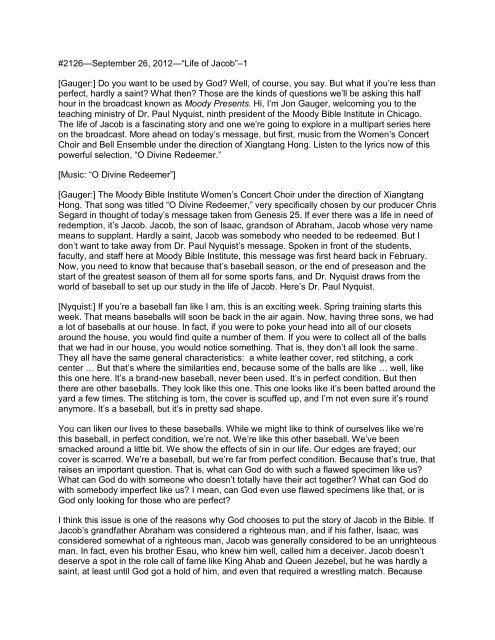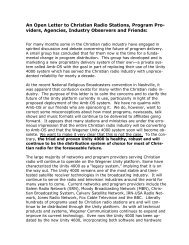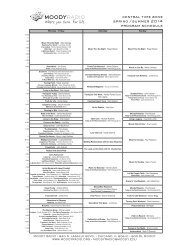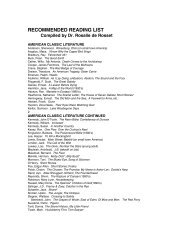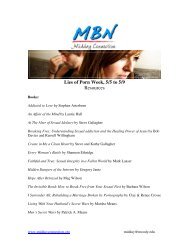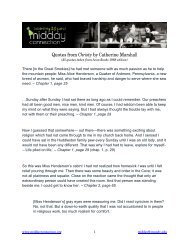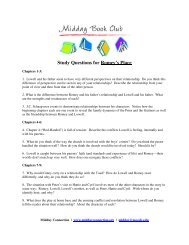Download Transcript - Moody Radio
Download Transcript - Moody Radio
Download Transcript - Moody Radio
Create successful ePaper yourself
Turn your PDF publications into a flip-book with our unique Google optimized e-Paper software.
#2126—September 26, 2012—“Life of Jacob”–1[Gauger:] Do you want to be used by God? Well, of course, you say. But what if you’re less thanperfect, hardly a saint? What then? Those are the kinds of questions we’ll be asking this halfhour in the broadcast known as <strong>Moody</strong> Presents. Hi, I’m Jon Gauger, welcoming you to theteaching ministry of Dr. Paul Nyquist, ninth president of the <strong>Moody</strong> Bible Institute in Chicago.The life of Jacob is a fascinating story and one we’re going to explore in a multipart series hereon the broadcast. More ahead on today’s message, but first, music from the Women’s ConcertChoir and Bell Ensemble under the direction of Xiangtang Hong. Listen to the lyrics now of thispowerful selection, “O Divine Redeemer.”[Music: “O Divine Redeemer”][Gauger:] The <strong>Moody</strong> Bible Institute Women’s Concert Choir under the direction of XiangtangHong. That song was titled “O Divine Redeemer,” very specifically chosen by our producer ChrisSegard in thought of today’s message taken from Genesis 25. If ever there was a life in need ofredemption, it’s Jacob. Jacob, the son of Isaac, grandson of Abraham, Jacob whose very namemeans to supplant. Hardly a saint, Jacob was somebody who needed to be redeemed. But Idon’t want to take away from Dr. Paul Nyquist’s message. Spoken in front of the students,faculty, and staff here at <strong>Moody</strong> Bible Institute, this message was first heard back in February.Now, you need to know that because that’s baseball season, or the end of preseason and thestart of the greatest season of them all for some sports fans, and Dr. Nyquist draws from theworld of baseball to set up our study in the life of Jacob. Here’s Dr. Paul Nyquist.[Nyquist:] If you’re a baseball fan like I am, this is an exciting week. Spring training starts thisweek. That means baseballs will soon be back in the air again. Now, having three sons, we hada lot of baseballs at our house. In fact, if you were to poke your head into all of our closetsaround the house, you would find quite a number of them. If you were to collect all of the ballsthat we had in our house, you would notice something. That is, they don’t all look the same.They all have the same general characteristics: a white leather cover, red stitching, a corkcenter … But that’s where the similarities end, because some of the balls are like … well, likethis one here. It’s a brand-new baseball, never been used. It’s in perfect condition. But thenthere are other baseballs. They look like this one. This one looks like it’s been batted around theyard a few times. The stitching is torn, the cover is scuffed up, and I’m not even sure it’s roundanymore. It’s a baseball, but it’s in pretty sad shape.You can liken our lives to these baseballs. While we might like to think of ourselves like we’rethis baseball, in perfect condition, we’re not. We’re like this other baseball. We’ve beensmacked around a little bit. We show the effects of sin in our life. Our edges are frayed; ourcover is scarred. We’re a baseball, but we’re far from perfect condition. Because that’s true, thatraises an important question. That is, what can God do with such a flawed specimen like us?What can God do with someone who doesn’t totally have their act together? What can God dowith somebody imperfect like us? I mean, can God even use flawed specimens like that, or isGod only looking for those who are perfect?I think this issue is one of the reasons why God chooses to put the story of Jacob in the Bible. IfJacob’s grandfather Abraham was considered a righteous man, and if his father, Isaac, wasconsidered somewhat of a righteous man, Jacob was generally considered to be an unrighteousman. In fact, even his brother Esau, who knew him well, called him a deceiver. Jacob doesn’tdeserve a spot in the role call of fame like King Ahab and Queen Jezebel, but he was hardly asaint, at least until God got a hold of him, and even that required a wrestling match. Because
Jacob possessed an uncommon amount of a common characteristic, and that is ambition. Hewanted whatever he wanted when he wanted it in the way that he wanted it. So he misledpeople, he deceived people, and then he ran from his problems. He was a deeply flawed man.But then again, so are we. Just look in the mirror. You’ll see Jacob there and all his warts.So because there’s so much we can learn from this man Jacob, we’re going to do a quick fivepartseries in the life of Jacob. Now, we don’t have time to go through all the episodes in his life,so we’re just going to jump in and out in certain points in his life, and we’re going to start in thatthis morning. The question we want to raise this morning is, why did God choose to use aflawed man like Jacob to carry on His line of blessing? Why would He use Jacob? Why wouldHe use an imperfect specimen like that? Then we’ve broadened out to an even bigger question,and that is, why does God use anyone in His kingdom work? Why you, and why me? We’regoing to see why this morning. We’re going to see why, as the story of Jacob begins, not in thecradle but in the womb.If you have your Bibles, turn with me to Genesis 25. The story of Jacob begins in verse 19, soturn in your Bibles to the book of Genesis, chapter 25, and beginning in verse 19. Now, I needto set the context for you here, because we’re diving right into the middle of this book. As youwell know, in chapters 12–50 of this book God gives us the birth and the growth of the covenantpeople. It all begins back in chapter 12 with Abraham. Abraham was just this idol worshiper inUr until God called him unto Himself. God gave him several promises, including the promise thatHe would make him into a great nation. As you know, Abraham fathered two sons. The first wasIshmael, who was born of Hagar, the handmaiden of Sarah. The second was Isaac, the child ofpromise. Now, the descendents of Ishmael are recorded in verses 12–18 of this chapter, and ifyou look through those verses you will see that Ishmael was a very prolific father; he had manysons. But that wasn’t true of Isaac. In fact, for the first twenty years he had no descendants,because his wife Rebekah was barren. So look what it says beginning in verse 19.Now these are the records of the generations of Isaac, Abraham's son: Abrahambecame the father of Isaac; and Isaac was forty years old when he tookRebekah, the daughter of Bethuel the Aramean of Paddan-aram, the sister ofLaban the Aramean, to be his wife. Isaac prayed to the Lord on behalf of his wife,because she was barren.In other words, she suffered from the same thing as did her mother-in-law, Sarah. Sarah, as youknow, was unable to have children until very late in life, when she finally conceived at the age of90. Interestingly enough, this became the same situation as Rebekah’s daughter-in-law, Rachel.She wasn’t able to have children until later in her life, and then she tragically died in the birth ofher second son, Benjamin. So infertility was not an unknown problem to this family, but itperhaps would have raised a nagging question in Isaac’s mind, and that is, “Did I somehow veeroff course here? Did I somehow get off and veer off God’s plan and purposes for my life?”Because, you see, Isaac knew he was carrying a line of blessing. Isaac knew that he had topass that line of blessing on to his descendents. But for twenty years there were nodescendents. For two decades there were no heirs. So the natural reaction was, “Did I get offbase here somewhere? Did my father’s servant choose the wrong woman to be my wife? Imean, how can barrenness possibly be part of God’s plan and purposes for my life?”Have you ever wondered that before? Have you ever pondered that question before? If you’renormal, you have, because that’s the natural reaction we have when we go through a time of
personal barrenness. You know, we’re going through a rough stretch, and our ministry keepsrunning into roadblocks. Our job may not be progressing the way that we thought it would.Maybe finances are tough because the economy continues to be on the skids, and then maybeon top of all of that your spiritual life is as dry as a bone, and there’s no life or joy in it. When yousit back and evaluate all of that, you wonder, “Did I somehow veer off God’s purposes here? DidI somehow get off course? Because how can this time of barrenness be part of God’s plans andpurposes for me?”That’s just it. Personal barrenness does not necessarily mean you’ve veered off God’s plan andpurposes for your life. In fact, it can be an important precursor for it. That’s the way it was withthe birth of Samuel. That’s the way it was with the birth of Samson. That may be exactly whatHe has in mind for you.If so, then what God wants is not for us to take matters in our own hands; He wants us to leavethem in His hands. He wants us to pray, and that’s what Isaac does here. If you look again inverse 21, it says, “Isaac prayed to the Lord on behalf of his wife,” and actually that word means“to entreat.” It means to ask God to remove an unpleasant situation. For instance, this is howthis word is used in Exodus 8 with the plagues that came upon Egypt. God sent the plague offrogs, so Pharaoh called in Moses and Aaron and says, “Go entreat God to take away thefrogs.” So Moses entreated God, and God took away the frogs. That’s what this word means.And that’s what Isaac does here. He prays to the Lord on behalf of his wife, which by the waytell us that Isaac learned something from the experience of his father, Abraham. Because whenSarah was barren and unable to conceive, did Abraham pray? Did Abraham entreat God? No.He took matters into his own hands. He first tried to make Eliezer his heir, and then later on hethen raised up an heir in Ishmael. And Isaac had to deal with the conflict that that brought his lifefor the rest of his life.So learning something from his father, he prays to the Lord on behalf of his wife, and Godanswers. It says at the end of verse 21, “And the Lord answered him and Rebekah his wifeconceived.” Literally that reads, “He entreated God, and God allowed Himself to be entreated.”So He opened up the womb of Rebekah, and she conceived. And the lesson for us is: A time ofpersonal barrenness does not necessarily mean that we’ve veered off God’s plan and purposesfor our life. But when that happens it doesn’t mean we have to take matters into our own hands.We have to leave them in God’s hands. It means we need to pray.Now, our struggles don’t end when God answers prayer. One problem may be resolved, butother problems can immediately pop up. That’s what happens in this story. Isaac’s problem wasgetting Rebekah pregnant. Rebekah’s problem was being pregnant. Verse 22: “But the childrenstruggled together within her.” Rebekah’s womb became a war zone. There was fetal fightingamong the womb-mates. It says there that they struggled together within her, and that doesn’tmean she was just suffering a mild discomfort that most women face when they’re goingthrough the rigors of pregnancy. No, this was like a WWF wrestling match. I mean, this wordmeans “to smash,” or “to crush.” It’s used in the book of Judges to speak of skulls being crashedon the rocks. So she’s going through such internal pain and misery that she finally cries out, “If itis so, why then am I this way?” Actually she doesn’t even finish that sentence. What she reallysays is, “If this … why this … I …” And she’s going through such pain that she wonders whethershe needs to keep on living.One writer put it like this: He said, “What a unique conflict we have here, a conflict of twinswhich rages even in the womb and so vehemently that their mother is driven to despair. To
Jacob and Esau, any room was too small when they were together. Their first battlefield is theirmother’s womb.” “What shall I do?” Rebekah wonders in despair.So the problem of barrenness was solved, but a second problem presented itself. Today weprobably would try and solve that problem by consulting with an obstetrician, but Rebekah,taking the cue from her husband, decides to consult with God. So it says at the end of verse 22,“So she went to inquire of the Lord.” While we might think that she just went off and prayedsomewhere, that’s not what this word means. She went to make inquiry of the Lord. In otherwords, she went to someone who could make an inquiry of the Lord for her, probably a prophet.And the information she received back from this supernatural sonogram was more than sheever would’ve anticipated, because here is what God told her, verse 23: “Two nations are inyour womb; and two peoples will be separated from your body; and one people shall bestronger than the other; and the older shall serve the younger.”Rebekah receives three surprises when she gets back this word. The first surprise: She iscarrying not just one baby, but two. She has twins. The second surprise: These two boys aregoing to become two great nations. It says, “Two nations are in your womb; and two peoples willbe separated from your body.” Then the third surprise: The older shall be subordinate to theyounger, because it says in the last line there, “And the older shall serve the younger.”If that were true, then that would mean that God would be working in a way completely differentthan the cultural norms of that day. Back in ancient society, as is true in many parts of the worldtoday, it was the oldest son who had rank and privilege. All sons got a portion of the familyinheritance, but the oldest son, being the firstborn, got a double portion. That was just the norm.But you see here that God doesn’t often work in that way. In fact, the Bible is filled withexamples of this, where God works in contradiction to the norms of society. I mean, Ishmaelwas the oldest son of Abraham, not Isaac, but Isaac was the child of promise. Joseph was oneof the youngest sons of Jacob, but all of the sons bowed down to him. See, that’s just how Godtends to work. He works sometimes in contradiction to the norms of society.[Gauger:] And it’s there we are unfortunately going to need to hit the pause button in this, ourfirst opening week in a study on the life of Jacob, a fascinating life study that will continue hereon <strong>Moody</strong> Presents, and we’re hopeful that you’re able to join us. I think I find this study sofascinating because … well, Jacob is such a flawed person like myself that I kind of see myselfin him in some ways. Maybe you feel the same as you listen. Well, be encouraged. There is alot more from Scripture to learn, a lot more life lessons that we’re going to apply as we studyJacob through the great teaching ministry of Dr. Paul Nyquist. Let me remind you that at ourwebsite, moodypresents.org, you can hear today’s message again. That’s right, online audio isthere right now, so you can just click a button and hear it all again. We also have printedtranscripts you can download, share with a friend, email, pass along, enjoy them, and use themhowever you would. There’s no charge for that. Also at moodypresents.org, MP3s and CDs ofeach message are available for purchase. I’m Jon Gauger for producer Chris Segard, sayingthanks so much for joining us today, and I hope you’ll be back next week as we continue in ourseries on the life of Jacob, right here on <strong>Moody</strong> Presents.


